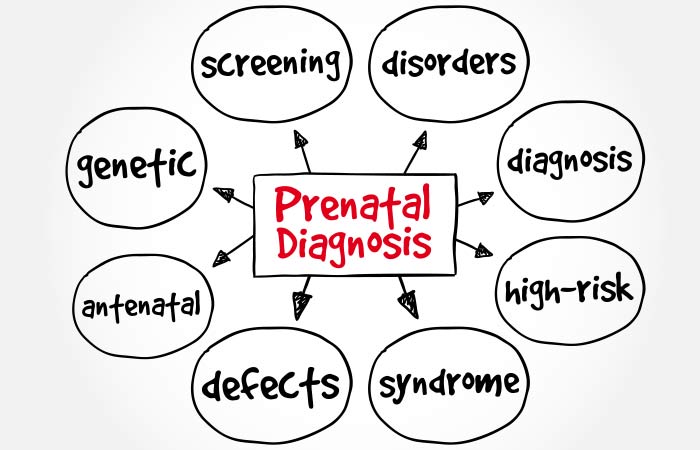
Shutterstock
Pregnancy is often accompanied by a lot of worries for your child. These worries are amplified, particularly, if you’re having a late pregnancy, if you have an older child, or a family member who has a genetic condition. Today, with the help of a simple blood test, you can know about the health of your unborn baby. During the early weeks of your pregnancy, your doctor will ask you if you want to have a Non-Invasive Prenatal Screening. This test can help determine if your baby has a potential genetic abnormality. If you are considering Non-Invasive Prenatal Screening, there are a few things you need to know. We’ve listed five important things to keep in mind before you go ahead with this procedure:
1. What Is Non-Invasive Prenatal Screening?
Image: Shutterstock
It is natural to have a lot of questions about your baby during your pregnancy. As expecting parents, we tend to worry a lot about our child’s health, even before birth. With the help of Non-Invasive Prenatal Screening, a few of your questions can be answered. For example, through this screening, you will be able to assess if your baby is at risk for any genetic conditions, such as Down Syndrome (1). This procedure is also known as a Non-Invasive Prenatal Test. However, medical professionals prefer to call it Non-Invasive Prenatal Screening instead of Non-Invasive Prenatal Test, as it cannot confirm if your child will have that particular condition.
If you need to know for sure that your baby will have a genetic condition, you will have to undergo diagnostic testing. With the help of a diagnostic test, you will be able to tell if your child has a particular genetic disorder, as well as what disorder this will be.
2. How Does The Screen Work?
Image: Shutterstock
The Non-Invasive Prenatal Screen uses DNA to assess your child’s genetic condition. DNA, or Deoxyribonucleic Acid, is a carrier of genetic information. It is present in every cell of the human body and all other living organisms. DNA is also found circulating in the blood. Those free-floating bits of DNA are called cfDNA or cell-free DNA. During your pregnancy, your baby’s DNA can be found in your blood as well. This is known as cffDNA or cell-free fetal DNA (2).
For the Non-Invasive Prenatal Screening, a sample of your blood is taken. The medical practitioner will then examine the DNA and look for any evidence of a genetic disorder. This is a non-invasive procedure; it only consists of a blood test, making it risk-free for you and your baby.
3. What Can You Know From A Non-Invasive Prenatal Screen?
Image: Shutterstock
It is important to know that typically, chromosomes come in pairs. If the baby has three copies of one particular chromosome, it is known as a trisomy. The Non-Invasive Prenatal Screen particularly screens the blood for trisomy. Generally, the procedure screens for Down Syndrome, Patau Syndrome, and Edward Syndrome. The test has a 99% accuracy for Down Syndrome and 97% accuracy for Edward Syndrome. The reliability is slightly less for Patau syndrome, with 87% accuracy. However, a Non-Invasive Prenatal Screening is not conclusive, and a follow-up diagnosis must be made to disprove or confirm the results (3).
Sometimes your doctor will also screen for microdeletions. This is a genetic abnormality where the chromosomes are missing a specific section. The screening can help assess this as well; however, the testing for microdeletions is less accurate than testing for trisomy (4).
In addition to checking for genetic disorders, the Non-Invasive Prenatal Screen can also tell you the gender of your child (5). You can opt out of this information; tell your doctor if you would or wouldn’t want to know.
4. Who Should Undergo A Non-Invasive Prenatal Testing?
Image: Shutterstock
Any expecting mother, after the completion of ten weeks, can take the Non-Invasive Prenatal Screening. It is an individual choice, so you can decide whether you want to undergo this screening or not. However, you should opt for it if you are at risk for certain genetic disorders. It is advisable to undergo the screening if you are over the age of 35. Doctors also recommend this screening for mothers who already have a child diagnosed with a genetic disorder.
5. Does This Work For Everyone?
Image: Shutterstock
The Non-Invasive Prenatal Screening is not a hundred percent accurate. Although it can be around ninety-nine percent accurate for certain conditions like Down’s Syndrome, this testing may not work in the following cases (6):
- If you are overweight or have a body mass index that is around 30 and above.
- If you have been taking blood thinners.
- If you are carrying multiples.
- If you conceived your baby with a donor egg.
- If your baby was conceived with donor sperm and egg.
It might upset you if the results from a Non-Invasive Prenatal Screen are positive. However, keep in mind that the results from this procedure are not always accurate, and a follow-up diagnostic test is necessary. Refrain from making decisions based on the screening results alone and talk to a genetic counselor if you have any concerns. Have you undergone a Non-Invasive Prenatal Screening recently? What do you think about it? Let us know in the comments.

















